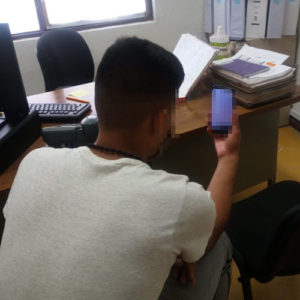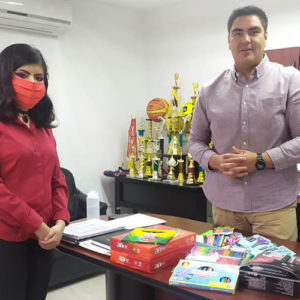Youth Detention and COVID-19
The COVID-19 pandemic has created a crisis in juvenile detention centers around the world. According to the U.N. Global Study, 1.4 million children are locked behind bars, often in terrible conditions. Abuse, extortion, overcrowding and unsanitary conditions are commonplace.
Now, during the COVID-19 pandemic, detention centers have been on lockdowns, removing staff such as teachers, psychologists, and social workers, leaving only security staff, and barring families from visiting their children in order to prevent the spread of the disease. These conditions are rife for human rights abuses and trauma for children.
Juvenile Justice Advocates International is responding as fast as possible to:
- Publish recommendations.
- Engage decision makers to implement these recommendations.
- Work directly with detention facilities on policy changes.
- Coordinating data collection on policy changes implemented by governments in Latin America.
Juvenile Justice Advocates International’s (JJAI) vision is that children are only detained as a last resort and for the shortest period of time possible. JJAI works towards this by collaborating and providing technical assistance to youth justice operators to implement internationally recognized best practices. During the COVID 19 pandemic, JJAI would like to communicate the following concerns:
- The spread of COVID 19 inside of youth detention facilities.
- The continued respect of youth’s human rights.
- The risk to mental health of detained youth.
Based on these concerns, JJAI asks youth justice systems and youth detention facilities to take the following actions:
- Implement precautionary measures for prisons as recommended by the World Health Organization:
- Elaborate a plan to keep general population, visitors and staff informed.
- Raise awareness between visitors and staff about preventative measures.
- Implement recommended preventative measures – have soap and disinfectant gel available in entrances, cells/dormitories and administrative areas, physical distancing, and responses to suspected COVID-19 cases.
- Ensure that youth are not housed in overcrowded facilities or areas of facilities.
- Implement recommendations from authorities about health tests to people in contact with the youth – such as staff and visitors.
- Ongoing health screenings of youth to identify those at-risk or those with underlying respiratory conditions that require specialized / off-site care.
- Promote a more rigorous routine of the youth’s personal hygiene and of the cleanliness of the facilities.
- If limiting family visits:
- Take all sanitary precautionary measures as recommended by health authorities.
- Consider reducing the overall number of family members that can visit rather than ending family visits entirely if possible.
- Limit visitation by vulnerable populations such as elderly and children under 12.
- Consider allowing family visits without physical contact.
- If suspending family visits:
- Allow free telephone calls daily of at least 20 minutes per youth.
- Allow calls through cell phones in facilities where there are no established telephone lines for the youth.
- Allow video calls if possible.
- Provide all materials necessary to write letters or emails, as well as electronic devices required to maintain contact with their family members. As an example, allow photos to be taken of the youth and to send said photos through WhatsApp or other secure messaging services to their families.
- Implement a transparency mechanism which shares the daily incident report with the corresponding authorities such as Child Protection or Human Rights Ombudsman.
- In case of not having a daily report of incidents, we suggest the implementation of said reports and the accompanying transparency.
- Allow a weekly visit from the Human Rights Ombudsman which also includes review of all preventative measures recommended to avoid contamination and ensure that lock-downs and preventative measures are not endangering youth.
- In case of limiting the access to recreational activities, workshop, vocational training due to restricting access by volunteers, teachers, technical staff, etcetera consider implementing the following activities in accordance with COVID-19 preventative measures:
- Increase time of sports activities.
- Increase time allotted in libraries and leisure areas for board games.
- Increase time allotted for access to appropriate TV programs and movies.
- Allow books in dormitories.
- Allow notebooks, pens and/or pencils inside cells and other areas with supervision.
- Allow board games inside cells and other areas with supervision.
- Be diligent in detecting signs of depression and suicidal ideation.
- Maintain weekly contact with families to keep them informed and to listen to their comments, doubts and concerns.
- Create a forum to communicate to the youth all preventative measures and all the changes in normal procedures in the detention center to keep them informed and listen to their comments, doubts and concerns, always respecting their right to be heard. Make use of this space to explain to the youth what the current events are without unnecessarily alarming them, but to keep them fully aware of the situation.
Specific recommendations for Juvenile Courts, Prosecutors and Detention Administrators:
- Suspend the implementation of custodial measures.
- Provisional pretrial release for the following:
- Youth with any medical conditions.
- Pregnant youth.
- Youth who have spent 3 months or longer in pretrial detention.
- Youth charged with petty offenses, non-violent offenses or misdemeanors.
- Switch to house arrest/confinement if the case allows it.
- Provide post-trial conditional release to the following:
- Youth with any medical conditions.
- Pregnant Youth.
- Youth with under partial-deprivation of liberty sentences – such as evening or weekend lock-up.
- Youth with under 6 months of served time of their custodial sentence.
- Postpone or modify sentences utilizing non-custodial precautionary measures.
We encourage all detention centers to reach out to us in case of requiring technical assistance to elaborate these protocols of transparency. Likewise, we encourage all detention centers which collaborate directly with our staff to inform us of any material needs this time such as access to cell phones for family contact or board games and other recreational activities. Please contact us through: info@jjadvocates.org. You can also follow our most recent updates on our Twitter account: @jji_esp or Facebook account: facebook.com/jjimexico/ and facebook.com/juvenilejusticeadvocates/
In keeping with the recommendations in Mexico for COVID-19, our staff is working remotely at home. Seeing this as an opportunity to create a series of webinars where juvenile justice experts can exchange ideas and good practices. Through our sixth webinar, we had 14 different national and international expert panelists and around 1,200 participants. The following are the webinars (in Spanish):
March 26: COVID-19 Challenges in the Mexico´s Youth Justice System
April 2: COVID-19 and Steps for Juvenile Courts and Juvenile Detention Centers
April 9: COVID-19 Humanitarian Crisis for Detained Children in Latin America
April 23: COVID 19 Bolivia – Guaranteeing Justice for Youth
April 24: COVID 19 Challenges in Petitioning for Release from Youth Detention
April 30: COVID 19 Identifying Strengths in the Youth Justice System
April 30: COVID 19 Bolivia – Programming for Youth in the Justice System during the Pandemic
May 8: COVID 19 Bolivia – Lessons and Practices for the Youth Justice System during the Pandemic
Join our weekly live webinars on COVID-19 and youth detention
Our work continues in our project sites using the precautionary measures recommended by the WHO. Some of our team is continuing to work directly with detention centers in Mexico. Youth and staff need our help now more than ever, which is why we started our COVID-19 Aid Program.
The COVID-19 Aid Program prioritizes providing personal sanitizing supplies, materials for alternative programming and alternative family communication.

Youth video calling with his mother.
Summary of donations:
| Supplies | Quantity |
|---|---|
| Sanitizing Supplies | 601 |
| Face Masks | 650 |
| Devices for video calls | 2 |
| Books | 92 |
| Magazines | 26 |
| Board Games | 83 |
| Art Supplies | 30 |
| Music Supplies | 4 |
| Sports Equipment | 82 |
| Haircutting Equipment | 1 |
| Medicines | 34 boxes |
| Groceries for released youth | 20 |
| Clothing Items | 18 |
| Pump for Drinking Water | 1 |
* Donations sent to centers in Mexico City, Aguascalientes, Campeche, Chihuahua, Durango, Guerrero, Sonora, Saltillo y Tamulipas.

Donation deliver to the Durango detention center.
If you would like to make an in-kind donation, please contact Samantha Moreno at samantha@jjimexico.org.
Juvenile Justice Advocates International, in conjunction with Fair Trials, the Center for International Human Rights at Northwestern School of Law and Documenta AC, developed surveys for detention center directors and justice sector officials in Mexico in order to document the actions that justice systems are taking. Via regional partnerships with Defense for Children International (Defense de Niñas y Niños Internacional) we are also collecting data in Central and South America.
The objective of this collaborative alliance is to create a registry of policies being implemented, share the best practices and advocate to conserve beneficial changes after the pandemic has past.

*Preliminary results will be published in June 2020.
UNICEF – Children in detention are at heightened risk of contracting COVID-19 and should be released
Protecting Prison Populations from Infections Coronavirus Disease – ICRC
Annie E. Casey Foundation – Juvenile Justice Priorities During and After the COVID-19 Pandemic
(Spanish Only) Comisión Nacional de los Derechos Humanos – Medidas cautelares a todas las autoridades del sistema penitenciario nacional
Fair Trials – The Public Health Need to Keep People out of Detention – Practical Guidance
Penal Reform – Coronavirus: Healthcare and human rights of people in prison
(Spanish Only) Save the Children Mexico – Proteger los derechos de las niñas y niños ante la contingencia sanitaria por el COVID-19
